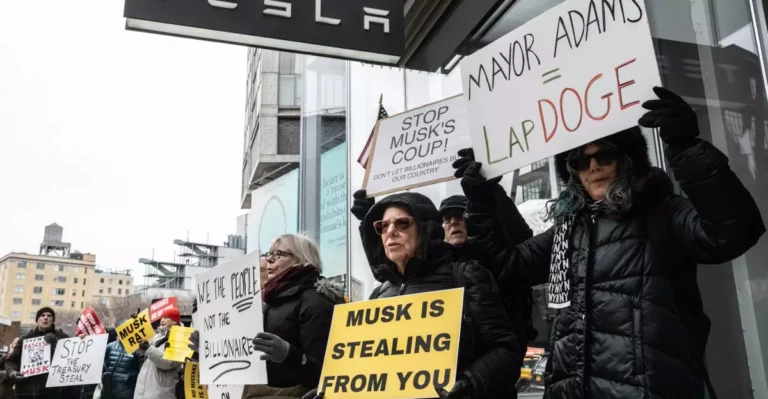In recent weeks, Tesla, a company that has long been considered a trailblazer in the electric vehicle industry, has found itself at the center of a public relations storm. Protests have erupted at Tesla showrooms across the country, fueled by anti-Elon Musk sentiments and gatherings organized under the banner of the #TeslaTakeover movement. This rising wave of dissatisfaction raises profound questions about Tesla’s leadership and the implications of Musk’s personal brand on the company’s market and cultural image.
The protests occurring outside Tesla showrooms are not monolithic in nature. Rather, they represent a fragmented but passionate call from both consumers and activists. The overarching sentiment among protestors centers on dissatisfaction with Tesla’s CEO, Elon Musk, particularly his controversial stance on political and social issues. Since the onset of the Trump presidency, Musk has been perceived as aligning himself with far-right ideologies. Grievances have been aired through chants and banners demanding accountability and ethical leadership. Notably, slogans likening Tesla’s vehicles to “swasticars” underscore the depth of feeling among those opposing Musk’s political affiliations and actions.
Despite their scattered nature across the United States—from major cities like New York and San Francisco to smaller towns like Golden Valley, Minnesota—the protests have gained traction, highlighting a crucial divide between the public’s perception of Musk and Tesla’s corporate identity. For many consumers, purchasing a Tesla vehicle once represented aligning with innovation and sustainability; now, this alignment is being re-evaluated in light of Musk’s controversial political actions.
The Impact on Tesla’s Brand and Market Performance
Tesla’s stock performance tells a story of growing investor anxiety. Reports indicate that since Trump’s inauguration, Tesla’s stock has plummeted by 21 percent, prompting investors to scrutinize Musk’s influence over the company more critically. Insiders at Tesla have reportedly expressed a “resignation” sentiment regarding Musk in recent meetings, suggesting that key players within the organization fear the repercussions of his leadership style.
As Tesla continues to grapple with these internal and external pressures, the company’s future may depend on how it navigates this turbulent waters. The rift growing between Tesla’s investor community and Musk’s increasingly polarizing public persona could lead to significant ramifications in leadership and corporate strategy.
Celebrity Activism and Broader Implications
High-profile figures are increasingly joining the protest movement, adding celebrity clout to the grassroots effort. Activist and filmmaker Alex Winter’s vocal support, coupled with musician Sheryl Crow’s symbolic actions—such as parting ways with her own Tesla—amplify the messaging against Musk. Crow’s public declaration that “there comes a time when you have to decide who you are willing to align with” resonates with a growing number of consumers who face ethical dilemmas regarding their purchases.
Cultural figures like Winter and Crow utilize their platforms to shed light on the ethical dimensions of consumerism in the age of polarized politics. Their participation demonstrates how corporate brands like Tesla are not merely products but are also entwined with larger societal issues, and how consumers are increasingly holding companies accountable for their leadership and ethos.
As protests continue to evolve, Tesla appears to be at a crossroads. The likelihood of sustained protests places pressure not only on Musk but also on the company’s leadership to become more stakeholder-oriented—paying attention to how their activities affect public perception, investor confidence, and ultimately, the bottom line.
It remains to be seen whether the demonstrations will lead to tangible changes or if they will fizzle out as consumer attention shifts. However, one takeaway is clear: the growing discontent with Musk is forcing a reckoning in the electric vehicle sector, where consumers demand that ethical leadership aligns with the innovative spirit Tesla once epitomized.
The protests surrounding Tesla reflect broader social tensions and the evolving landscape of consumer activism. The messages being voiced at Tesla showrooms resonate deeply, not only challenging Musk’s status but also urging consumers to consider the implications of their purchases and loyalties in a hyper-political age. Whether this movement will lead to significant change for both Tesla and its controversial CEO remains uncertain, but the emerging narrative signifies a critical moment for corporate accountability.


Leave a Reply